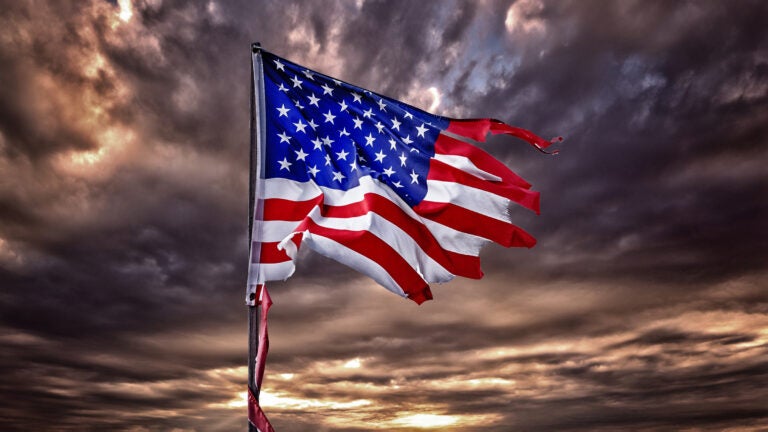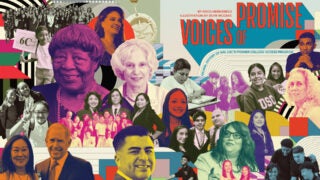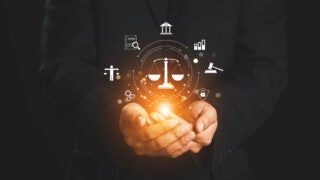
USC experts fear that polarization of public life is having a chilling effect on democratic processes. (Photo/iStock)
How hyperpartisan bullying threatens democracy
USC experts explain why polarization erodes civility in public discourse, turning private citizens and elected officials into targets.
People doing jobs once considered non-controversial — public health workers, librarians, election workers, school board officers — are increasingly bullied online, threatened and swept into the vortex of partisan vitriol.
Public officials face an alarming rise in “swatting,” a dangerous practice in which SWAT teams are summoned to their homes by fake emergency calls. Online vigilantes dox private individuals and elected officials by publishing private phone numbers and home addresses on websites and social media. USC experts fear the trend is having a chilling effect on democratic processes.
“These modern realities are a major deterrent for careers in politics. Officials understandably fear exposing their spouses, children, extended families and themselves to the threats and ugliness on social media,” said Kamy Akhavan, executive director of the USC Center for the Political Future at the USC Dornsife College of Letters, Arts and Sciences. “Public officials today have the highest levels of scrutiny and the lowest levels of privacy that public officials have ever experienced. Everyone has a camera in their pocket, politics are hyperpartisan, and social media and mainstream media incentivize scandal.”
Akhavan pointed to examples of high-profile cases of harassment and assault. In October 2022, the husband of then-House Speaker Nancy Pelosi was attacked in the couple’s San Francisco home by a partisan radical, who has since been convicted and is in prison.
Last month, former U.S. Rep. Katie Hill settled her “revenge porn” case against her ex-husband. Hill resigned in 2019 after he and conservative outlets published nude photos of her online without her knowledge or consent.
Such examples underscore the risk of harassment and violence facing government and elected officials in an era of social media, viral conspiracy theories and political polarization.
“For these reasons, plus the unbelievably high cost of campaigns and the closed nature of partisan politics, fewer people want to run for public office,” Akhavan said.
Polarization of public life: Distrust in expertise
Disinformation and confusing health messages during the COVID-19 pandemic increased distrust of medical and scientific expertise. A JAMA Network Open study found that 66% of physicians reported online attacks during the COVID-19 pandemic, a jump from 23% in the months prior to the pandemic.
Orange County’s chief health officer resigned in 2020 after receiving a death threat in response to mandating face coverings. And that wasn’t the only case. From March 2020 to January 2021, there were 120 resignations, 58 retirements, 20 firings and 24 other departures among health officials in the United States, according to a study in the American Journal of Public Health.
Rita Burke, an associate professor of clinical population and public health sciences at the Keck School of Medicine of USC, recently published a related study in Frontiers in Public Health.
“For most, this was a new experience leaving them unsure of where to turn for help. As a result, there has been an exodus of public health officials from health departments significantly weakening our public health infrastructure,” Burke said.
School governance on democracy’s front line
With the pandemic, Americans began paying closer attention to school boards. These unpaid, usually nonpartisan voluntary bodies are charged with oversight of their school district policies, including key decisions about masking — or not masking — and remote education.
Since then, school boards have become one of democracy’s front lines, often serving as proxies in the country’s cultural wars. Personal threats and attacks are resulting in resignations and turnover among board members, school health officers, superintendents, librarians and teachers.
“Education and educators have been drawn into the societal debates that find citizens on both sides of major issues about our youth, their curriculum and how they should be taught. The divide impacts districts, their leaders and every teacher,” said Maria Ott, who holds the Irving R. and Virginia A. Melbo Chair in Education Administration at the USC Rossier School of Education.
“Actions such as angry protests and lack of civil discourse model behaviors that communicate lack of trust in our schools and for those who have dedicated their careers to preparing the nation’s future citizens. We need to value our right to disagree respectfully and model what we aspire to for our students and remember that our schools are the heart of our communities and our democratic society.”
Universities provide a path to solutions amid polarization of public life
It’s clear the country needs to find a way to lower the temperature in public discourse. USC experts believe the key — perhaps unsurprisingly — is education and the campus setting itself. That’s why in 2018 USC launched the Center for the Political Future with director Robert Shrum, a Democrat, and co-director Mike Murphy, a Republican. They’re longtime political strategists and friends.
The center is known for bringing together students, leaders and experts from all political parties and organizations who might normally stand on opposite sides of the room to come together and discuss political matters.
“Here at the center, we believe in respecting each other and respecting the truth,” Shrum said before he introduced the Jan. 22 debate at Bovard Auditorium among candidates hoping to win a California Senate seat.
William Tierney, a University Professor Emeritus and founding director of USC Rossier’s Pullias Center for Higher Education, said colleges and universities are “a natural space where civil conversation should occur.”
“Higher education is a key component of the democratic public sphere,” he added. “We have to find ways to have difficult dialogues where students, faculty and staff are able to puzzle through the seemingly intractable problems that confront us. If we are unable to have those conversations on our campuses, then where will they occur?”
Julie Marsh, a professor of education policy at USC Rossier and at the USC Price School of Public Policy, sums it up: “Schools are one of the few places in which individuals from different backgrounds come together and have opportunities to deeply interact and potentially recognize commonalities. Schools can prepare students to be critical consumers of information and to learn how to treat others as equal members of civil society.”
Featured Experts
Kamy Akhavan
Expert in polarization, unconscious bias, politics, nonprofit, leadership, tribalism, bridging divides, media literacy, civics, debate and management
Julie Marsh
Expert in K-12 education policy & reform, RAND researcher 2002-2010, Co-editor Educational Evaluation and Policy Analysis (2019 – 2023), School boards & educational governance, School district reform & politics, School choice policy, Accountability, Equity-oriented reforms, Data-driven reforms, Incentive programs for teachers and Instructional & coaching policy
Maria Ott
Expert in school district politics and budgets, Los Angeles Unified School District (LAUSD), superintendents, online learning and K-12 education



